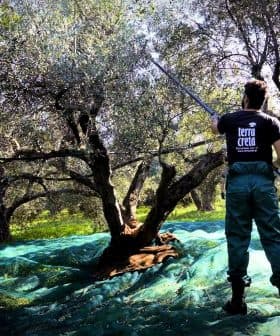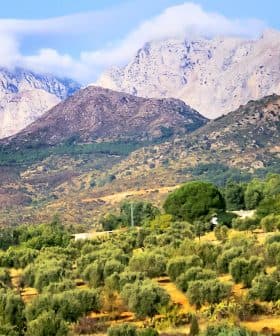After Record Year, Tunisian Production Falters

After a record-breaking harvest in 2019, Tunisian olive oil producers are expecting a much more modest yield in 2020, with an estimated 130,000 to 140,000 tons of olive oil expected this year compared to 400,000 tons last year. The decrease in production is attributed to many producers entering an off-year, lack of rainfall, and poor farming practices, but there is optimism for future production with new planting initiatives and improved education for farmers.
After recording a record-breaking harvest in 2019, Tunisian olive oil producers are expecting a much more modest yield in 2020.
According to Ajmi Larbi, the head scientist at the country’s Olive Institute (Instituto L’Olivier), Tunisia is expected to produce between 130,000 and 140,000 tons of olive oil this year, down from the 400,000 tons recorded last year.
There is a very significant fluctuation from one year to another due essentially to the high yield of the olive trees (in the on-year), but also to the climatic conditions that are very severe in our country.
Larbi attributed the sharp production decrease to many producers entering an off-year, a lack of rainfall and poor farming practices employed by some of the country’s producers.
An “on-year” and ample rainfall in 2019 were credited for that year’s bumper crop.
See Also:2020 Harvest Updates“There is a very significant fluctuation from one year to another due essentially to the high yield of the olive trees [in the on-year], but also to the climatic conditions that are very severe in our country,” Larbi said at a recent conference discussing the upcoming 2020 harvest.
Larbi said most of Tunisia’s olive-growing regions received 150 millimeters (5.9 inches) of rainfall or less this year, far below average annual precipitation rates of between 250 and 300 millimeters (9.8 and 11.8 inches).
The problem of too little rainfall is also exacerbated in Tunisia by the fact that 95 percent of the country’s 1.9 million hectares (4.7 million acres) of olive groves are not irrigated.
Larbi also attributed last year’s late harvest and poor agronomic practices employed by farmers to the precipitous production decrease.
“In the years where we have good harvests, farmers remain harvesting until April,” he said. “[As a result], the trees are very depleted when it takes so long to harvest them.”
Larbi said better education for farmers, including better pruning practices and other agronomic techniques, would help alleviate this problem and close the gap between on- and off-years.
He remained, however, optimistic about the future of Tunisian olive oil production.
“During the last five to six years we have planted more than 100,000 hectares (nearly 250,000 acres), which is a new area that is going to come into production within two to three years,” Larbi said. “Soon we will have much more production in the years in which there are very favorable weather conditions.”









